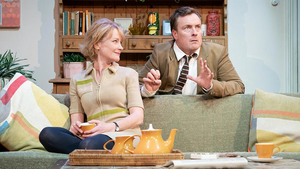Review: A DAY IN THE DEATH OF JOE EGG, Trafalgar Studios
![]() Claire Skinner and Toby Stephens reunite for the first time in 18 years in the late Peter Nichols' seminal 1967 play about parents coping with a disabled child. Does A Day in the Death of Joe Egg stand the test of time?
Claire Skinner and Toby Stephens reunite for the first time in 18 years in the late Peter Nichols' seminal 1967 play about parents coping with a disabled child. Does A Day in the Death of Joe Egg stand the test of time?
 Sheila (Skinner) and Bri (Stephens) play a married couple who have a daughter with cerebral palsy. Confined to a wheelchair and unable to speak, Joe is played by Storme Toolis, who has the condition in real life.
Sheila (Skinner) and Bri (Stephens) play a married couple who have a daughter with cerebral palsy. Confined to a wheelchair and unable to speak, Joe is played by Storme Toolis, who has the condition in real life.
Toolis commands our undivided focus and attention whenever on stage. It's an expressive and heart-wrenching performance with carefully considered use of body language, posture and even moments of silence that manage to say a great deal.
Having a disabled actor portray a disabled character is not something that was done when the play premiered, so it serves as a nice reminder of how far theatre has come in this regard.
Based on Nichols' own experiences raising a disabled daughter, this autobiographical play mixes black comedy with farce and tragedy. This assortment of styles takes some getting used to and the audience are certainly taken out of their comfort zone, not knowing whether to laugh at certain jokes or quite how to react to some of the dialogue. It's undoubtedly a challenging and provocative piece.
With a subject such as this, there is of course a danger that the play could stray towards the morose and sentimental. Nichols refuses to allow this to happen, opting to use humour as a means for the characters to cope. Whilst this no doubt generates some feelings of awkwardness, it works dramatically and if anything makes the family's plight even more heartbreaking.
Peter McKintosh's set is brimming with Sixties style. The colourful rug, peach walls and Pop Art-style pictures are contrasted with bland furnishings of the period, emphasising the hidden bleakness that resides within the house. As the box set rises on a lift during the opening, the lighting rigs are exposed, again providing a stark contrast between the naturalistic set and 'reality', which is echoed in the characters' use of humour as a means of escapism. "Dear Mr Fantasy" forms a key component of Edward Lewis's sound design, transporting us to the Sixties whilst accentuating the play's key theme.
When Bri uses direct address to the audience, we are again reminded that this is in fact a heightened and stylised piece of theatre, with the characters stepping out of the play to voice their inner thoughts. This is aided by Prema Mehta's lighting design, which constantly guides our attention from character to character.
With a coffee-stained shirt and somewhat dishevelled attire, Bri does appear the stereotypical teacher from the off, but Stephens manages to refrain from entering the realms of caricature, instead presenting us with a complex and tormented man. Bri's jokes and word choices generate feelings of discomfort with archaic words such as 'spastic' jarring somewhat. We soon come to understand why he uses humour, though, and why Sheila permits it. As his mask slips, the black comedy routine only succeeds in emphasising the painful resentment Bri feels. It's an enthralling and memorable performance.
Claire Skinner has a knack for drawing us in with her warm and relatable characterisation. We feel like we know Sheila. Effortlessly transitioning between emotional, guilt-ridden and putting on a lighthearted demeanour, Skinner has fantastic chemistry with Stephens, and the two are highly convincing as a married couple under strain.
There is strong support from Lucy Eaton as Pam, who openly suggests Joe should be "put to sleep" and struggles to even look in her direction. It again makes for uncomfortable viewing, but Eaton captures her character and her - to modern audiences - shocking opinions well.
Clarence Smith also delivers a robust performance as Pam's opinionated other half, Freddie. Patricia Hodge plays Bri's mother, and her interactions with both her son and daughter-in-law are painfully true to life. It's an assured and nuanced performance that capitalises on the comedy of the play.
With the women mainly confined to the role of housewife, and with the dialogue often being very much of its time, one has to question whether the play remains relevant for a 2019 audience. But the answer is undoubtedly yes.
There are often news articles discussing the wellbeing of carers, with arguments that they should be provided more support. The fact that the parents are the carers here gives them license to be brutally honest and vocal about their situation - but the question remains, who cares for the carer? The different ways men and women deal with stress and strain is also explored and is again something that remains prevalent, particularly with men disguising their true feelings and putting on a front.
Under Simon Evans' direction the pace flows well and the cast more than do justice to the script. Moving and deeply affecting but laced with dark humour throughout, this revival reminds us just what a poignant and thought-provoking piece of theatre Nichols created, and one that remains as important as ever.
A Day in the Death of Joe Egg at Trafalgar Studios until 30 November
Photo credit: Marc Brenner


